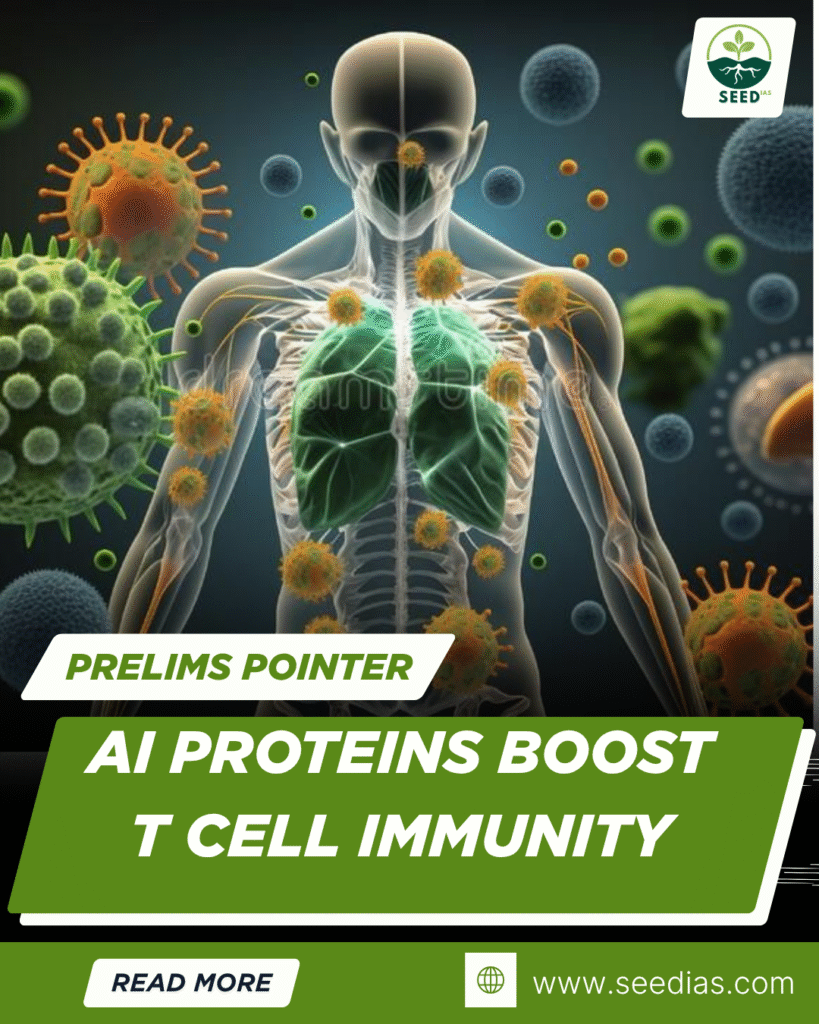Why in NEWS
Harvard scientists have developed AI-designed proteins that activate the Notch signalling pathway, enabling large-scale production of T cells — a breakthrough for cancer immunotherapy and vaccine development.
Key Terms/Concepts
| Term | Explanation |
|---|---|
| T Cells | White blood cells that play a central role in immune response by targeting infected or cancerous cells. |
| Notch Signalling Pathway | A critical cell communication system regulating immune cell development, tissue stability, and cell fate decisions. |
| Progenitor Cells | Intermediate cells that arise from stem cells and develop into specialized cells like T cells. |
| AI-Designed Proteins | Proteins engineered using artificial intelligence to perform specific biological functions safely inside the body. |
| CAR-T Therapy | A type of immunotherapy where T cells are modified to better recognize and attack cancer cells. |
| Memory T Cells | Long-lasting T cells that remember past infections, enabling quicker immune responses in the future. |
Key Highlights
| Area | Details |
|---|---|
| Breakthrough Mechanism | AI-based design of synthetic proteins that safely activate the Notch signalling pathway to transform progenitor cells into T cells. |
| Protein Design Pioneer | David Baker, awarded the 2024 Nobel Prize in Chemistry, led the development of AI-powered protein design. |
| T Cell Generation | Lab-grown T cells produced at scale using bioreactors with AI-designed protein activators. |
| Clinical Applications | Enhances CAR-T cell therapy and promotes memory T cells, improving vaccine responses. |
| Animal Studies | Showed increased immune activity, stronger memory responses, and better tumor targeting. |
| Future Therapies | AI can design tailor-made proteins that guide T cells to cancer sites and neutralize immune-suppressive environments. |
In a Nutshell
Memory Code: T.A.N.G.L.E — T Cells, AI, Notch, Growth, Lab, Enhanced Immunity
AI-designed proteins act as synthetic Notch activators, allowing Lab-scale growth of T cells, enhancing immunity against Cancer and Viral infections.
Prelims Practice Questions
- Which of the following pathways is targeted by AI-designed proteins to enhance T cell development?
(a) JAK-STAT pathway
(b) Wnt pathway
(c) Notch signalling pathway
(d) PI3K-Akt pathway - David Baker, Nobel Laureate in Chemistry (2024), is known for contributions to:
(a) Quantum computing in biology
(b) Nanotechnology in medicine
(c) Computational protein design using AI
(d) CRISPR gene editing - Which of the following statements about progenitor cells is correct?
(a) They are fully differentiated cells
(b) They divide and form stem cells
(c) They are intermediate cells that give rise to specialized cells
(d) They only exist during embryonic development
Answer Key – Prelims
| Q No. | Answer | Explanation |
|---|---|---|
| 1 | (c) | Notch signalling is the specific pathway activated by AI-designed proteins. |
| 2 | (c) | David Baker is renowned for using AI to design functional synthetic proteins. |
| 3 | (c) | Progenitor cells are intermediary cells that develop into specialized types like T cells. |














